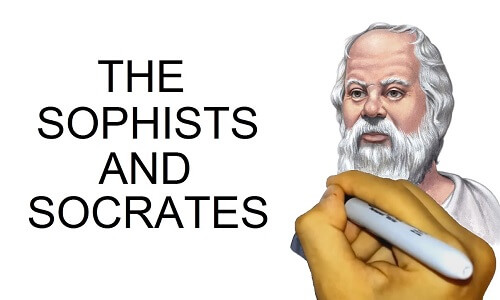Criticism of Sophism-Urdu

سوفسطائیت کا تنقیدی جائزہ
If all who have engaged in the profession of education. They were willing to state the facts instead of making greater promises. Then they can possibly fulfill, they would not be in such bad repute with the lay-public. As it is, however, the teachers who do not scruple to vaunt their powers with utter disregard of the truth. They have created the impression that those who choose a life of careless. Criticism of Sophism-Urdu
Platonic Tradition
Let us consider what the Platonic tradition has to say about the sophists’ practice of accepting money for instruction. Although, Plato never explicitly has Socrates condemn the sophists for taking money. The Platonic corpus is full of satirical diatribes against their pecuniary aspirations.
Thematic Sequence
Here Xenophon establishes a thematic sequence consisting of wisdom, money, and prostitution. Money runs the danger of corrupting and even conflating the things of the mind with the sphere of the body. Of course, This is exactly the opposite trajectory of what we are wont to see in Plato. In the Symposium and the Alcibiades love (ἔρως) is restricted to using the physical as an initial stepping stone. Only to climb the philosophical ladder to reject the body in favor of the mind. Thus gradually transforming itself from a physical, sexual desire directed at a specific individual.
Socratics Versus Sophists
In his influential article “Socratics Versus Sophists on Payment for Teaching,”. David Blank undertakes to “summarize ‘popular’ complaints about the sophists’. He concludes that the sophists charged outrageous fees. According to Blank, there is sufficient evidence in non-Platonic authors and genres. Mainly old comedy, to support the claim that complaints directed at the sophists go well beyond Platonic criticism. And that Plato’s hostile characterization of them simply reflects these pre-existing, negative popular attitudes.
Sophistic greed
What upsets Isocrates is that they deviate from their publicly stated position. In contrast, Plato’s one-dimensional picture of sophistic greed. Isocrates acknowledges two points about teaching for pay. One that the sophists themselves publicly promote (disregard for money), and one that attracts Isocrates’ censure (greed). Far from openly announcing their fees, the Isocratean sophists are careful. At least rhetorically, not to violate the propriety of the social norms by presenting themselves as engaged in money-grabbing practices. They do not publicly endorse the practice of offering instruction for money. Nor do they describe their relationship with students as an economic rapport between producer and consumer.
Note: This article was originally published on our related blog. We have merged content from our educational subdomains to provide easier access in one place. The original post is still available at: https://videos.urdutubes.com/2019/04/criticism-of-sophism-urdu.html
All content is owned and authored by us, and redistribution or reuse is not allowed without permission.
Note: This post is part of our content merger from multiple educational subdomains. To access the original content, visit: books.urdutubes.com for book-related content, PDFs, and downloads, or videos.urdutubes.com for video-related posts. All content is owned and authored by us, and redistribution or reuse is not allowed without permission.




![Khawateen Digest February 2025 [Download PDF] Khawateen Digest – February 2025 Edition: A Must-Read for Every Woman! The February 2025 issue of Khawateen Digest is packed with engaging stories, insightful articles, and practical tips that cater to the modern woman. From inspiring tales to expert beauty and health advice, this edition has it all. Whether you're in the mood for a gripping story or seeking helpful tips for daily life, this digest will keep you hooked. Don't miss out on the latest edition – download the Khawateen Digest February 2025 now and enjoy a well-rounded read that speaks to every woman's interests.](https://www.urdutubes.com/wp-content/uploads/2025/04/Khawateen-Digest-February-2025-Download-PDF-218x150.jpg)
![Khawateen Digest January 2025 [Download PDF] Khawateen Digest January 2025 [Download PDF]](https://www.urdutubes.com/wp-content/uploads/2025/04/Khawateen-Digest-January-2025-Download-PDF-218x150.jpeg)
![Kiran Digest April 2024 [Download PDF] Kiran Digest April 2024 [Download PDF]](https://www.urdutubes.com/wp-content/uploads/2025/04/Screenshot-2025-04-13-113317-218x150.png)
![Kiran Digest March 2024 [Download PDF]](https://www.urdutubes.com/wp-content/uploads/2018/05/KiranDigestMay2018255BDownloadFreePDF255D.jpg)







